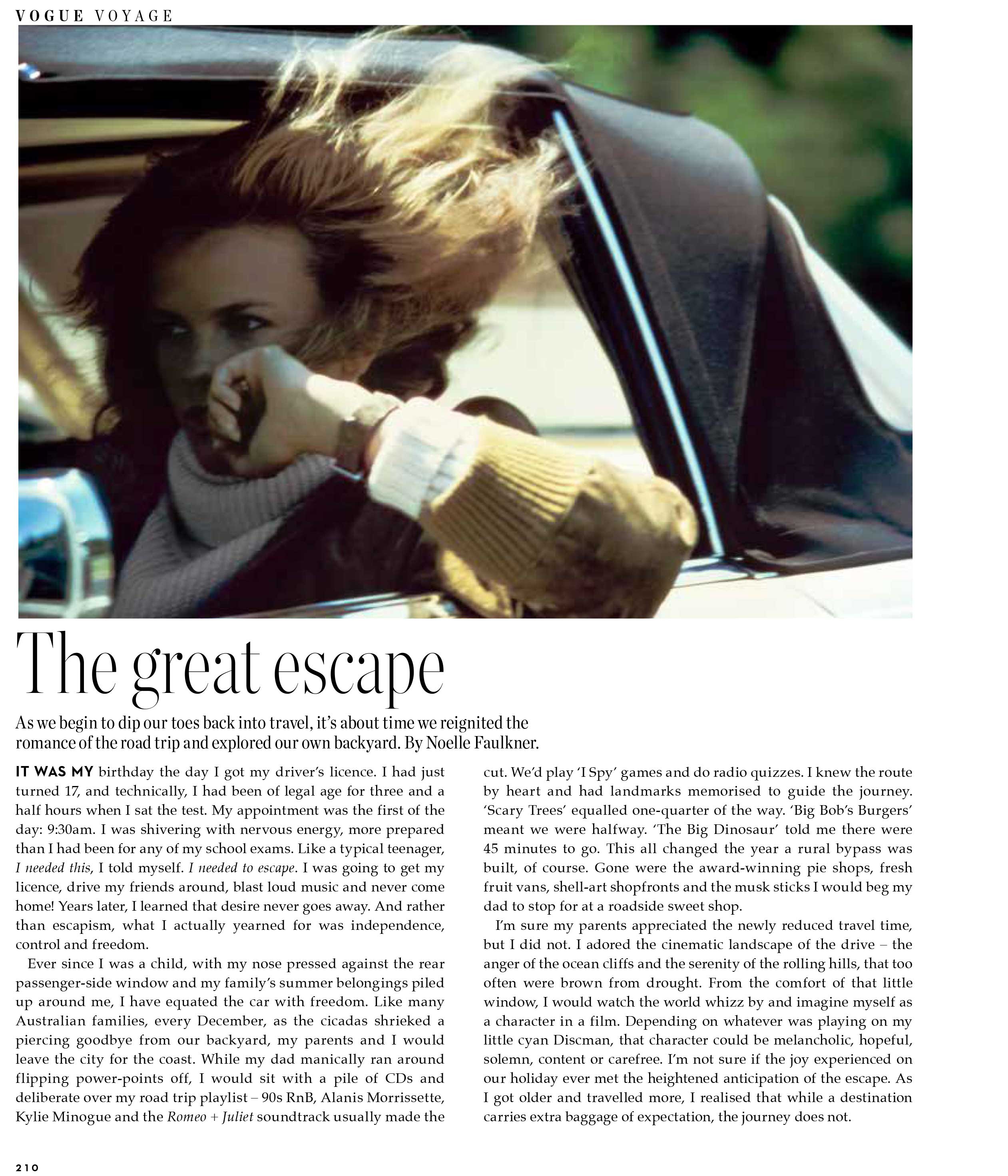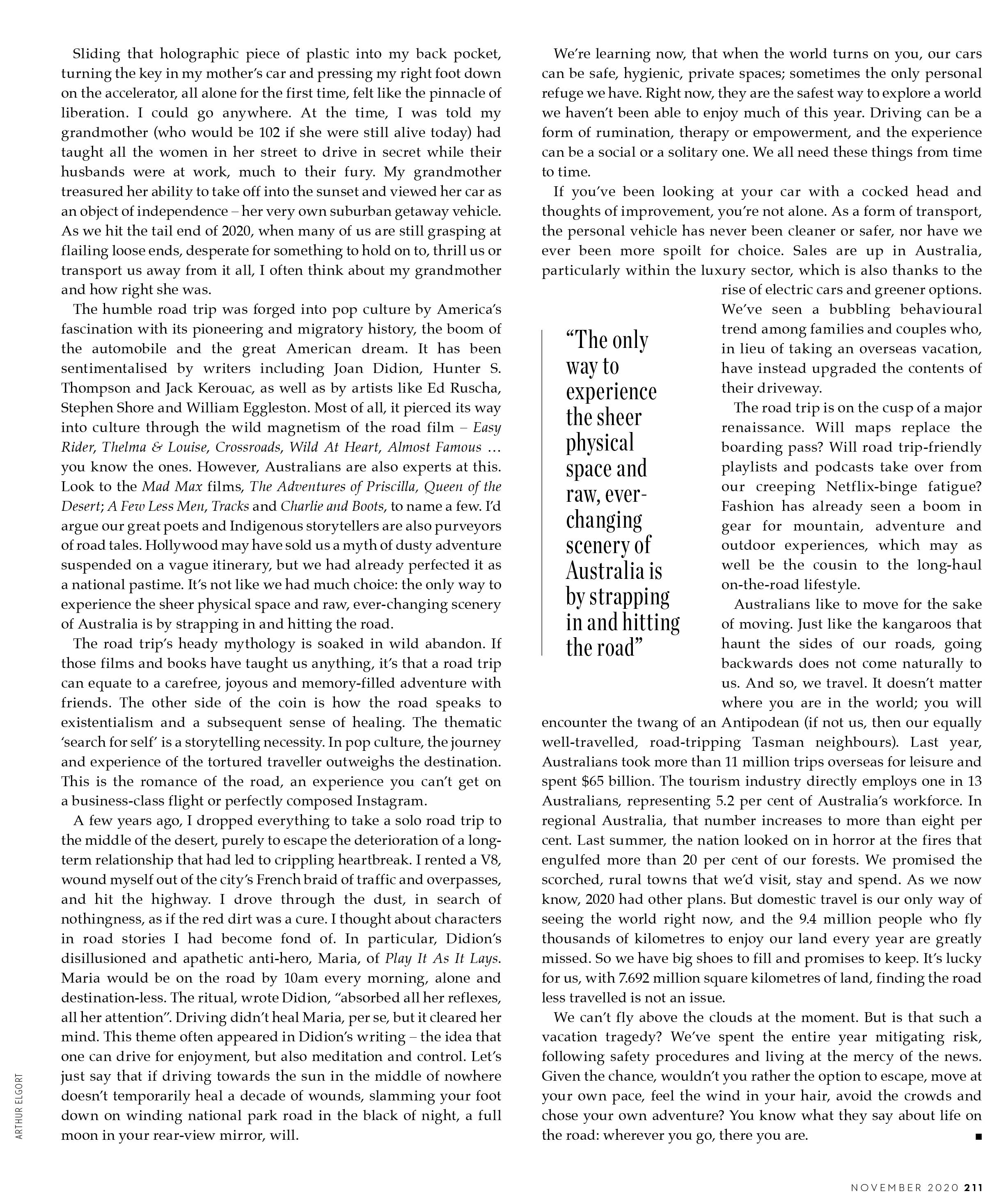
As we begin to dip our toes back into travel, it's about time we reignited the romance of the road trip and explored our own backyard. Here's why road maps are replacing boarding passes.
VOGUE Australia, November 2020 (PDF) (LINK)
It was my birthday the day I got my driver’s licence. I had just turned 17, and technically, I had been of legal age for three and a half hours when I sat the test. My appointment was the first of the day: 9:30am. I was shivering with nervous energy, more prepared than I had been for any of my school exams. Like a typical teenager, I needed this, I told myself. I needed to escape. I was going to get my licence, drive my friends around, blast loud music and never come home! Years later, I learned that desire never goes away. And rather than escapism, what I actually yearned for was independence, control and freedom.
Ever since I was a child, with my nose pressed against the rear passenger-side window and my family’s summer belongings piled up around me, I have equated the car with freedom. Like many Australian families, every December, as the cicadas shrieked a piercing goodbye from our backyard, my parents and I would leave the city for the coast. While my dad maniacally ran around flipping power-points off, I would sit with a pile of CDs and deliberate over my road trip playlist – 90s RnB, Alanis Morissette, Kylie Minogue and the Romeo + Juliet soundtrack usually made the cut. We’d play ‘I Spy’ games and do radio quizzes. I knew the route by heart and had landmarks memorised to guide the journey. ‘Scary Trees’ equalled one-quarter of the way. ‘Big Bob’s Burgers’ meant we were halfway. ‘The Big Dinosaur’ told me there were 45 minutes to go. This all changed the year a rural bypass was built, of course. Gone were the award-winning pie shops, fresh fruit vans, shell-art shopfronts and the musk sticks I would beg my dad to stop for at a roadside sweet shop.
I’m sure my parents appreciated the newly reduced travel time, but I did not. I adored the cinematic landscape of the drive – the anger of the ocean cliffs and the serenity of the rolling hills, that too often were brown from drought. From the comfort of that little window, I would watch the world whiz by and imagine myself as a character in a film. Depending on whatever was playing on my little cyan Discman, that character could be melancholic, hopeful, solemn, content or carefree. I’m not sure if the joy experienced on our holiday ever met the heightened anticipation of the escape. As I got older and travelled more, I realised that while a destination carries extra baggage of expectation, the journey does not.
Sliding that holographic piece of plastic into my back pocket, turning the key in my mother’s car and pressing my right foot down on the accelerator, all alone for the first time, felt like the pinnacle of liberation. I could go anywhere. At the time, I was told my grandmother (who would be 102 if she were still alive today) had taught all the women in her street to drive in secret while their husbands were at work, much to their fury. My grandmother treasured her ability to take off into the sunset and viewed her car as an object of independence – her very own suburban getaway vehicle. As we hit the tail end of 2020, when many of us are still grasping at flailing loose ends, desperate for something to hold on to, thrill us or transport us away from it all, I often think about my grandmother and how right she was.
The humble road trip was forged into pop culture by the United States’ fascination with its pioneering and migratory history, the boom of the automobile and the great American dream. It has been sentimentalised by writers including Joan Didion, Hunter S. Thompson and Jack Kerouac, as well as by artists like Ed Ruscha, Stephen Shore and William Eggleston. Most of all, it pierced its way into culture through the wild magnetism of the road film – Easy Rider, Thelma & Louise, Crossroads, Wild At Heart, Almost Famous … you know the ones. However, Australians are also experts at this. Look to the Mad Max films, The Adventures of Priscilla, Queen of the Desert; A Few Less Men, Tracks and Charlie & Boots, to name a few. I’d argue our great poets and Indigenous storytellers are also purveyors of road tales. Hollywood may have sold us a myth of dusty adventure suspended on a vague itinerary, but we had already perfected it as a national pastime. It’s not like we had much choice: the only way to experience the sheer physical space and raw, ever-changing scenery of Australia was by strapping in and hitting the road.
The road trip’s heady mythology is soaked in wild abandon. If those films and books have taught us anything, it’s that a road trip can equate to a carefree, joyous and memory-filled adventure with friends. The other side of the coin is how the road speaks to existentialism and a subsequent sense of healing. The thematic ‘search for self’ is a storytelling necessity. In pop culture, the journey and experience of the tortured traveller outweighs the destination. This is the romance of the road, an experience you can’t get on a business-class flight or perfectly composed Instagram.
A few years ago, I dropped everything to take a solo road trip to the middle of the desert, purely to escape the deterioration of a long-term relationship that had led to crippling heartbreak. I rented a V8, wound myself out of the city’s French braid of traffic and overpasses, and hit the highway. I drove through the dust, in search of nothingness, as if the red dirt was a cure. I thought about characters in road stories I had become fond of. In particular, Didion’s disillusioned and apathetic antihero, Maria, of Play It As It Lays. Maria would be on the road by 10am every morning, alone and destination-less. The ritual, wrote Didion, “absorbed all her reflexes, all her attention”. Driving didn’t heal Maria, per se, but it cleared her mind. This theme often appeared in Didion’s writing – the idea that one can drive for enjoyment, but also meditation and control. Let’s just say that if driving towards the sun in the middle of nowhere doesn’t temporarily heal a decade of wounds, slamming your foot down on winding national park road in the black of night, a full moon in your rear-view mirror, will.
We’re learning now, that when the world turns on you, our cars can be safe, hygienic, private spaces; sometimes the only personal refuge we have. Right now, they are the safest way to explore a world we haven’t been able to enjoy much of this year. Driving can be a form of rumination, therapy or empowerment, and the experience can be a social or a solitary one. We all need these things from time to time.
If you’ve been looking at your car with a cocked head and thoughts of improvement, you’re not alone. As a form of transport, the personal vehicle has never been cleaner or safer, nor have we ever been more spoiled for choice. Sales are up in Australia, particularly within the luxury sector, which is also thanks to the rise of electric cars and greener options. We’ve seen a bubbling behavioural trend among families and couples who, in lieu of taking an overseas holiday, have instead upgraded the contents of their driveway.
The road trip is on the cusp of a major renaissance. Will maps replace the boarding pass? Will road trip-friendly playlists and podcasts take over from our creeping Netflix-binge fatigue? Fashion has already seen a boom in gear for mountain, adventure and outdoor experiences, which may as well be the cousin to the long-haul on-the-road lifestyle.
Australians like to move for the sake of moving. Just like the kangaroos that haunt the sides of our roads, going backwards does not come naturally to us. And so, we travel. It doesn’t matter where you are in the world; you will encounter the twang of an Antipodean (if not us, then our equally well-travelled, road-tripping Tasman neighbours). Last year, Australians took more than 11 million trips overseas for leisure and spent $65 billion. The tourism industry directly employs one in 13 Australians, representing 5.2 per cent of Australia’s workforce. In regional Australia, that number increases to more than eight per cent. Last summer, the nation looked on in horror at the fires that engulfed more than 20 per cent of our forests. We promised the scorched, rural towns that we’d visit, stay and spend. As we now know, 2020 had other plans. But domestic travel is our only way of seeing the world right now, and the 9.4 million people who fly thousands of kilometres to enjoy our land every year are greatly missed. So we have big shoes to fill and promises to keep. It’s lucky for us, with 7.692 million square kilometres of land, finding the road less travelled is not an issue.
We can’t fly above the clouds at the moment. But is that such a vacation tragedy? We’ve spent the entire year mitigating risk, following safety procedures and living at the mercy of the news. Given the chance, wouldn’t you rather the option to escape, move at your own pace, feel the wind in your hair, avoid the crowds and chose your own adventure? You know what they say about life on the road: wherever you go, there you are.

